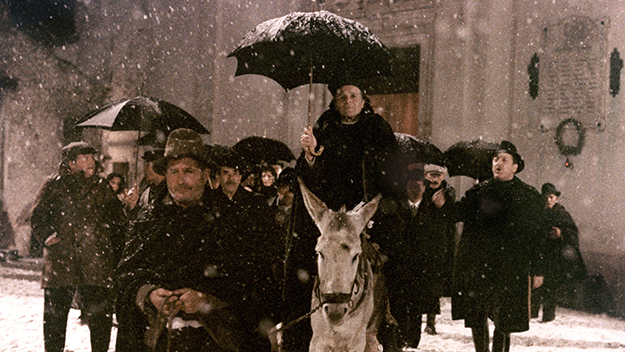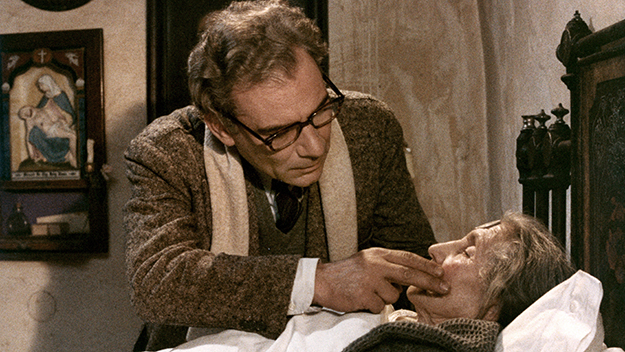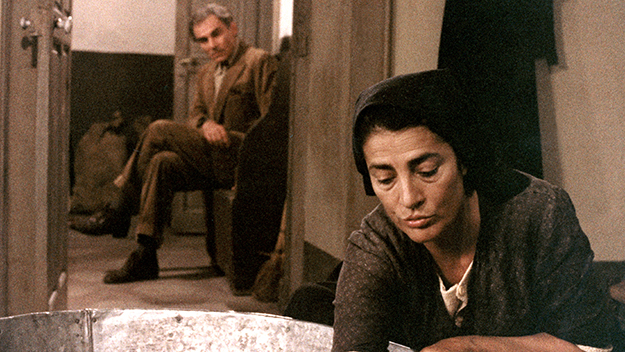Deep Focus: Christ Stopped at Eboli

Francesco Rosi’s 1979 adaptation of Christ Stopped at Eboli starts as Carlo Levi’s piercing threnody for the peasants of south-central Italy and ends as an intense celebration of the people who expanded his heart and thought. Sitting in his studio in Turin decades later, the grizzled, leonine anti-Fascist Carlo Levi (Gian Maria Volonte), reflects on his “internal exile” in 1935 to the remote region of Lucania for his opposition to Mussolini’s Abyssinian War. (His three-year term was abridged to one after the dictator won the conflict.) As he stares at portraits he painted in the tilted, craggy, sun-blasted town of Gagliano (pseudonym for Aliano), the villagers seem to train marrow-penetrating eyes on him. Levi confesses, in voiceover, that he broke his farewell promise to them by never returning to Gagliano. We can read his sadness and yearning in Volonte’s expressive face.
Then Levi does go back, in memory, to the winding journey he took through Lucania. At the depot in Eboli, the final stop on the main railroad line from North to South, he pats a shaggy dog with a cardboard tag reading, “My name is Barone. May he who finds me care for me.” When he walks away the dog finds him and becomes his constant companion as he does his time in the back country. En route to Gagliano, they traverse barren, vertiginous landscapes by locomotive, bus, and car, surrounded by rocks and clay spit up from the center of the earth, and trees so bare and gnarled that their trunks and branches resemble petrified tentacles. Levi treks deep into the unrecorded past. He says, “Christ never came here. Nor did time or the individual soul or hope. Nor did cause and effect, reason, or history. No one has set foot on this land except as a conqueror, an enemy, or an uncomprehending visitor.” Levi will be its first comprehending visitor.
Levi (1902-1975) was a writer, painter, and left-wing editor and statesman, twice elected to the Senate as an independent on the Communist ticket. He held a medical degree and did some clinical research, but he practiced as a physician only in Lucania, and solely to meet the demands of the peasantry. Rosi made this magnum opus as a tribute to Levi’s expansive spirit and a faithful rendering of his greatest work.
Forty years after its premiere, American audiences can savor its earthy and transcendent glory in its full 220-minute running time, in a print that Rialto has restored to its pungent, moody luster, with clear, nuanced subtitles by Michael F. Moore. The film was first produced for Italian television as a miniseries with four 55-minute episodes. Film Forum presents it with one intermission between two halves of two episodes each. This is the ideal way to experience Levi’s (and Rosi’s) daring act of immersion.
Watching it from start to finish in a theater, we feel as if we, too, have taken up residence in shockingly primitive, obscure locations. Near the end, when we see Levi re-emerge in Turin to argue with his radical friends about their reductive approach to the problems of “the South,” we are moved, shaken, and uplifted. Rosi and his co-writers (Tonino Guerra and Raffaele La Capria) have reshaped Levi’s discursive memoir of his year in Lucania (originally published in 1945) to create a drama that is equally meditative and emotional, and cumulatively potent and cathartic.
In Christ Stopped at Eboli, Levi, an archetypal fish out of water comes to feel at home on very dry land. We see him map out the boundaries of his hamlet/prison: an isolated hillside town with a population of mere hundreds, flanked by ravines in the shank of Italy’s boot. He investigates the sandy passageways into the single street leading in and out of the town square, then ambles along a strip of nonarable land just outside the village. Levi takes his carabinieri overseers to the border of his permissible walking space: the cemetery marks one edge; in the heat he sometimes rests at the cool bottom of a just-dug grave. As Levi explains in his memoir, Gagliano approximates “a sort of natural fortress, with a limited number of entrances and exits,” making it easy for the mayor to corral indifferent citizens into Fascist rallies.
Energetic hordes of children interrupt their play to spy on Levi. Between dawn, when bow-backed workers tread downhill with goats and donkeys, and dusk, when they trudge back up loaded with wood and fodder, strangely compelling customs surface in the village, like “a four-year-old girl wearing the habit, wimple, and veil of a nun, and a five-year-old boy in the cowl and cord of a monk.” At first he tries to assess the petty gossip of the gentry who gather daily in the plaza for twilight strolls before the daily mail call. The peasants’ company, though, proves more rewarding.

Word gets out that Levi is a physician, so women swarm into the house where he initially rooms, holding their squalling children up for treatment. They know that Gagliano’s doctors are incompetents. Levi resists practicing because he has no experience; after he overcomes his qualms and takes an active role in staving off the area’s outbreaks of malaria, the mayor receives orders to ban him from working as a doctor. Once Levi settles into his own place, he devotes himself to painting. The goading, rock-throwing children gradually form a joyous group character, especially when Levi engages them with his art. Intermittently, the voices of Fascist propaganda announce the progress of the war in Africa over radios and loudspeakers. Seasonal spectacles erupt spontaneously: a hog castrater comes to Gagliano to thin its herds of pigs, turning a corner of the town into a merry chaos; an eclipse casts Gagliano into fright-inducing darkness.
The drama emerges on fork-like prongs forged from Levi’s aesthetic temperament, medical expertise, literary grasp of character, and political sophistication. The union of these skills and talents enables him to perceive the stoic mettle of the common folk and the dark poetry of their ancient practices. Gagliano is small enough for Levi to grow familiar with each stratum, top to bottom, simply from random encounters. The authorities forbid fraternization, so he gains only second-hand knowledge of his fellow political prisoners. But Levi can drink in the rueful humor of a barber, a tailor, a driver, and other good fellows who emigrated to America, grew homesick, and returned, and still consider New York their capital, not Rome. And Levi absorbs the shared sympathies and superstitions of his patients as he diagnoses infections or malaria. As Levi wrote, he comes to see that their “passive brotherliness, this sympathy in the original sense of the word, as suffering together, this fatalistic, comradely, age-old patience, is the deepest feeling the peasants have in common, a bond made by nature rather than religion.” Rosi creates a breathing tapestry from their rough-hewn way of life—an Old World to match Jan Troell’s The New Land.
While Levi’s interactions with rustic laborers spark epiphanies, the people who exploit or berate them—Gagliano’s figures of power—confirm his analysis that the Fascist middle-class can justify itself solely by demeaning the people under them. Though they’re slippery, heinous, or delusional, they’re also a Dickensian panoply of characters. Paolo Bonicelli epitomizes the petty bourgeoisie as the mayor, Don Luigi, a puffed-up popinjay with an oleaginous manner. His Fascism is a matter of smug attitude and confident style. In his office he wears puttees to match his idol, Mussolini; he welcomes Levi’s company because the painter/doctor is a classy fellow. Alain Cuny offers a regal, oddly poignant counterpoint as Baron Nicola Rotunno, the devout Catholic land-owner. He collects his rents religiously, but in his view the political radical Levi, a godless materialist, is the man who prioritizes money. The only person Levi can get close to is the town’s disreputable priest, Don Traiella (played beautifully by François Simon as a tragicomic figure, all disjointed gestures and jitters). Don Traiella is another exile: the Church banished him to Gagliano for sexual misconduct with his seminary pupils. He’s bitter and rotten but intelligent and covertly witty, so Levi seeks him out as a fellow artist, scholar, and writer, though he’s let his books crumble under dust and chickenshit. Don Traiella’s sly subversion of the Christmas mass—and Levi’s delighted response to it—is the film’s comic peak.
The movie makes the point that if Levi speaks the same language as these characters, what he says to them is trivial compared to the profound silences he shares with the peasantry. He gleans surprising insights from the long-suffering tax collector, the put-upon goatherds, the hardscrabble farmers, and their children. Rosi fills the supporting cast with uncredited non-actors who bring an unforced fervor to their parts. We’re as fascinated as Levi when he watches a mustachioed old man blow air through a slit he cuts in the foreleg of a just-slaughtered goat. He’s trying to salvage every usable part of the animal’s body, aiming to shape its skin into a wineskin. The man explains that Rome has levied taxes on goats because the animals destroy northern crops. But they’re the only source of wealth for southern towns like Gagliano.
Because Volonte is a genius at embodying intangibles, he manages to externalize Levi’s burgeoning sympathy for this hot-air equivalent of Siberia. Rosi hinges his scenes and compositions on Volonte’s alternately quizzical and observant nature while his deep-focus imagery conveys the buried meanings of the peasants’ lives, including their knowledge of evil as a fact, “an earthly sorrow.” Time exists for them not as a measure for transacting business, not even as an expression of the seasons, but as a drop in the well of eternity. Because Rosi doesn’t dilute the power of their pagan beliefs, and because Pasqualino de Santis captures the landscapes and skyscapes with richly dappled cinematography, we find ourselves “reading” every passing thunderhead or each ripple in the clayey soil as a portent. In this film the purple-grey twilight exudes the same sense of imminence as dawn. When Levi’s progressive physician sister, Luisa, comes to visit him after months, we have lost track of the time—he could have been there just a few days, or forever. Played with bracing lucidity by Lea Massari (Murmur of the Heart), Luisa blows away his languor and his mental fog. She catalyzes his attempts to better the peasants’ lot.
From episode two on, Volonte portrays Levi as a questing sensibility, absorbing the experience around with him skeptically and then wholeheartedly. His neighbors believe: Satan walks the Earth and goats are the devil’s emissaries; the spirits of unbaptized children become poltergeists or playful gnomes; three angels guard each home at night—one for the door, one for the table, one for the bed. Their traditions reflect their knowledge of the omnipresence of Death: mourning sashes top each front door until the thick black ribbons rot away. Nominally Catholics, most attend Mass only on Christmas and flout the church’s rules and conventions.

Having lost so many men to wars or immigration, the women take on lovers and care for broods of children in a de facto matriarchy. Still, since they consider the sexual urge to be constant and overwhelming, decorum dictates that a woman may not come to a man alone even to toil as his housekeeper. Only a witch or a prostitute would take the job. Levi can employ Giulia (Irene Pappas) because she’s already had 17 children from, according to the book, almost as many men. Levi doesn’t idealize the peasants, but he does grow to love them. His willingness to abide by their customs keeps us off-balance. We’re shocked when Giulia welcomes a slap he gives her, either as a sign of sexual attention or as a show of absolute force. Pappas, always a formidable actor, turns Giulia into a enigmatic paragon of elemental female power.
Unlike his radical friends, who dismiss them as a rural lumpenproletariat, or the mini-Fascists of Gagliano, who view them as inferior specimens or cannon fodder, Levi refuses to simplify the peasants to fit preconceived notions or ideologies. He sees their tangled skein of superstition and faith as an organic response to the volatile countryside and the mood swings of their distant rulers. To protest the Mayor’s decree that Levi can’t practice medicine, the peasants don malicious makeup and perform a vicious broadside in front of Don Luigi’s house, caricaturing myopic doctors and officious fools. It’s an organic political act that Levi can relate to, because it’s true to the people and their heritage. It’s as if we’re seeing the slapstick folk roots of commedia del arte.
Later, church bells proclaim Italy’s triumph in the Second Italo-Abyssinian War. Then loudspeakers project Mussolini’s victory address into Gagliano’s high thin air. In a brilliant coup de cinema, Rosi sends De Santis’s camera flying through Lucania’s hills and fields as the leader jabbers on. The fieldworkers wonder why the bells are rung, then shrug off Il Duce’s blather. Imperial machismo has nothing to with the bedrock of their lives. The swooping camera and the apathetic human flock express Levi’s contention that peasant life and politics occupy separate planes—until Fascists force their participation. We recall the earlier vignette of an old woman lamenting as she sends her passive, boyish son to war in a ridiculous feathered hat.
Levi questions any utopia, left or right, that relies on “the religion of the State,” complete with idealistic proclamations and soul-crushing social machinery. When the Italian literary critic Paolo Milano reviewed Levi’s book in The New York Times Book Review in 1947, he wrote that Christ Stopped at Eboli “has been called in turn a diary, an album of sketches, a novelette, a sociological study and a political essay. It has more than a trait of each genre; yet it remains as hard to classify as every beautiful book, or as the man who wrote this one.” So is Rosi’s film.
As a triumphant cinematic adaptation of an “unfilmable” work, it ranks with John Huston’s The Dead and Philip Kaufman’s The Unbearable Lightness of Being. It’s both faithful and inspired. The play of strong yet covert emotions with ideas that gain depth as the film goes on is as pleasurable and invigorating as bold and exhilarating action.
Michael Sragow is a contributing editor to Film Comment and writes its Deep Focus column. He is a member of the National Society of Film Critics and the Los Angeles Film Critics Association.







